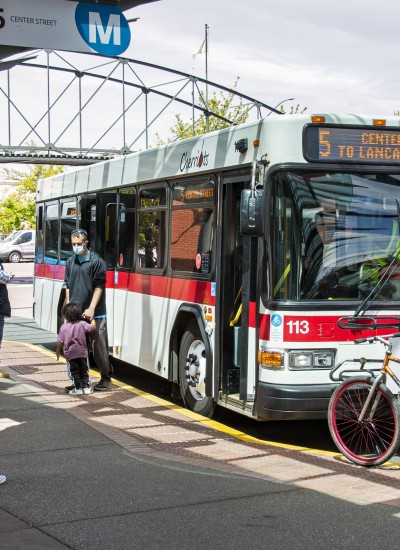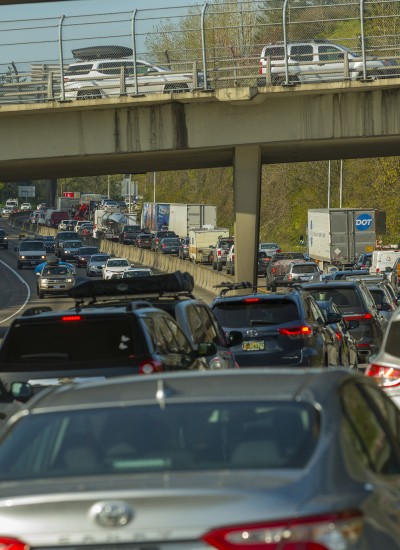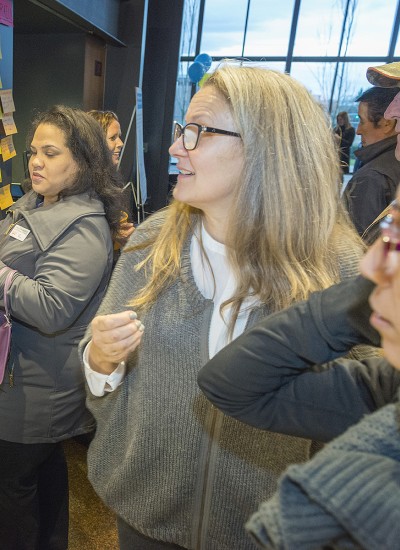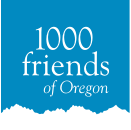By Cassie Wilson | 4.5-minute read
The Oregon legislature’s Joint Committee on Transportation is preparing to develop a funding package for the 2025 session, and 1000 Friends of Oregon is teaming with environmental- and transportation-justice partners to advocate for legislation that meets the needs of all Oregonians.
Transportation packages affect the type of infrastructure we’re investing in and who is paying for it. The package that the state legislature proposes next will shape far-reaching aspects of how our communities get around:
- how our roadways are maintained,
- the reliability and quality of public transit,
- the buildout of bicycle and pedestrian networks,
- the safety and resiliency of the whole transportation system, and
- how we reduce emissions in Oregon’s most polluting sector.
As we spend the next eight to 12 months fighting for Oregon’s transportation future, we’re operating with this core principle: It is essential that the 2025 funding package supports a safe, clean, fair, and accountable transportation system.

How we got here
About every eight years, the legislature reevaluates the state’s transportation programs and funding mechanisms through these transportation packages. Oregon’s last major transportation package was HB 2017 in 2017 (read our report).
That legislation included increases in the gas tax and registration fees and established various taxes – the transit tax, bike tax, vehicle dealer-privilege tax, and more – to pay for programs such as basic operations and maintenance across the state, Safe Routes to School, Oregon Community Paths, and the Clean Vehicle Rebate program. It also created many impactful multimodal programs that have more demand than dollars available, and it heavily invested in freeway megaprojects.

Funding coming in < money being spent
As vehicles have become less dependent on traditional gasoline year over year, Oregon has continued to rely on its pay-at-the-pump gas tax for transportation revenue, leading to decline in sustainable funding for operations, maintenance, and improvements of our roadways. The legislature has repeatedly raised the gas tax incrementally, but policymakers have yet to index the tax to inflation or replace it with new funding mechanisms, like its now-shelved tolling plan. Now, ODOT approaches a fiscal cliff.
It’s not just a revenue problem, however. Oregon also has an issue with transportation spending, especially on freeway megaprojects. The delayed I-5 Rose Quarter widening and phase-two I-205 expansion, plus the in-progress I-205 Abernethy Bridge replacement and expansion, amount to well more than $2 billion in costs. And they aren’t the only huge freeway projects on the table – others include the Interstate Bridge Replacement Project (which rebuilds and expands several miles of I-5 and their interchanges) and the I-5 Boone Bridge project (another bridge replacement, paired with building an auxiliary lane).
As we look to 2025, our transportation system should be financed by sustainable, equitable long-term funding mechanisms and supported by policies that prioritize maintaining our existing system and meeting our climate and safety goals.
Better priorities for people, communities, and planet
While ODOT focuses on freeways, hundreds of bridges around the state need replacement and seismic upgrades, many communities still lack basic bicycle and pedestrian infrastructure, far too many potholes dot state and local roads, and basic transportation needs go unmet for the approximately one in four Oregonians who can’t drive.
Freeway expansions don’t solve congestion, so instead, to reduce bottlenecks, the best approach would be to invest in infrastructure that makes it easier for people to not have to drive in the first place. Oregon should be equitably investing its transportation revenue across the state for the benefit of everyone, not just suburban commuters in the Portland metro area.
The 2025 package should prioritize increasing access to clean transportation modes, whether they be electrified public transit, electric vehicles of all classes, walking and rolling, or micromobility options like e-bikes and e-scooters. Investments should aim to eliminate serious injuries and fatalities, and improve livability through clean air and healthier built environments.

Getting involved
If Oregon continues passing a transportation package roughly every eight years (and is successful in 2025), then it will be 2033 before Oregonians have another opportunity to advocate for smart transportation investments in our communities. And when it comes to addressing climate change, every passing year is of the utmost importance. Each of us can urge legislators to create a 2025 package that boldly envisions and invests in the future of how Oregonians get around.
We’ll be sharing our work leading up to and throughout the 2025 legislation session, but your first opportunity to get involved starts this month. The Joint Committee on Transportation will be in your community (or online), so save the date to give public comment on how you want to see the legislature address the challenges facing our transportation system.
Want to be notified of input opportunities? Want help providing public comment? We’ll cover both, so sign up for our alerts to stay in the loop.
| Open house location | Date |
|---|---|
| Downtown Portland | Tuesday, June 4 |
| Tillamook |
Tuesday, June 18 |
| Albany | Tuesday, July 16 |
| Eugene | Wednesday, July 17 |
| Coos Bay | Wednesday, August 7 |
| Medford | Thursday, August 8 |
| Ontario | Wednesday, August 28 |
| Hermiston | Thursday, August 29 |
| Bend |
Thursday, September 12 |
| The Dalles | Friday, September 13 |
| Salem (virtual) | Wednesday, September 25 |
| Happy Valley | Thursday, September 26 |
| Hillsboro | Friday, September 27 |
Update, June 4: A previous version of this story misstated that the Boone Bridge project included additional lanes, rather than the one proposed auxiliary lane.
